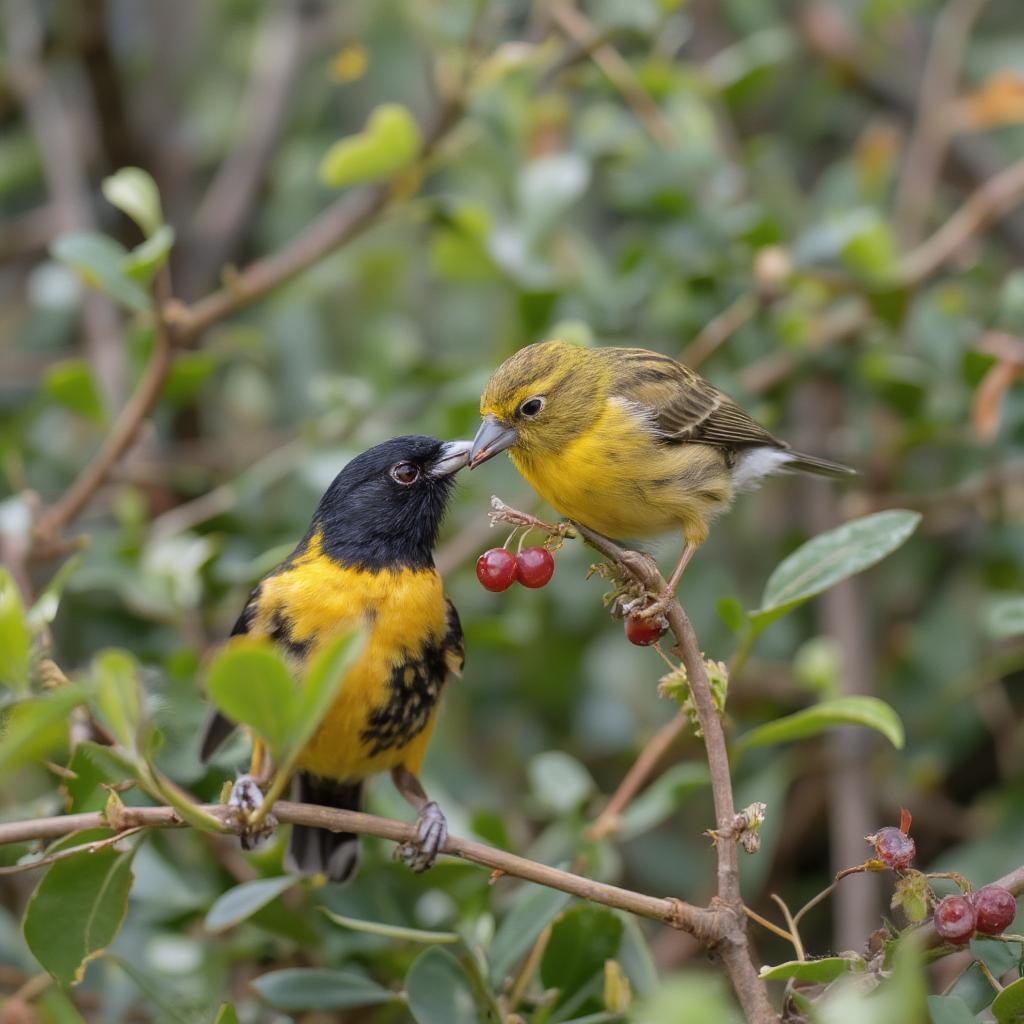Do Birds Feel Love? It’s a question that has intrigued scientists, birdwatchers, and animal lovers for centuries. While we can’t ask birds directly about their emotional lives, observing their behavior offers fascinating insights into the complex world of avian relationships. From elaborate courtship rituals to devoted parental care, birds exhibit behaviors that suggest a capacity for deep emotional bonds, potentially even love.
Exploring the Nuances of Avian Affection
While defining “love” in the human sense can be challenging, we can examine specific behaviors in birds that suggest strong attachments and emotional connections. These behaviors often mimic human expressions of affection, leading us to question whether birds, too, experience something akin to love.
Pair Bonding and Lifelong Mates
Many bird species form strong pair bonds, sometimes lasting a lifetime. These bonds go beyond simple mating and involve shared responsibilities like nest building, chick rearing, and defending territory. This dedication suggests a deep connection and mutual reliance, perhaps echoing the commitments seen in human relationships. Consider the albatross, known for their lifelong partnerships and elaborate greeting rituals upon reunion after long periods apart. Such behaviors hint at a level of emotional recognition and attachment that resonates with our understanding of love.
Courtship Rituals and Displays of Affection
Birds engage in a variety of courtship displays, from elaborate dances and songs to offering gifts of food or nesting materials. These rituals often involve intricate coordination and demonstrate a clear investment in attracting a mate.  A bird feeds its partner, a potential display of affection and care. Are these simply instinctual behaviors, or do they reflect a genuine desire for connection and companionship? The complexity and diversity of these displays suggest more than mere biological imperative. Is it so different from how humans express romantic interest? Think about how a male peacock displays his magnificent tail feathers, a blatant attempt to impress a potential mate.
A bird feeds its partner, a potential display of affection and care. Are these simply instinctual behaviors, or do they reflect a genuine desire for connection and companionship? The complexity and diversity of these displays suggest more than mere biological imperative. Is it so different from how humans express romantic interest? Think about how a male peacock displays his magnificent tail feathers, a blatant attempt to impress a potential mate.
Parental Care and Devotion
The dedication of bird parents to their offspring is another compelling example of potential avian love. From incubating eggs to tirelessly feeding and protecting their young, birds demonstrate a profound commitment to their family. This nurturing behavior, driven by a powerful instinct to ensure the survival of their offspring, could be interpreted as a form of familial love. This echoes the deep love and protective instincts seen in many human parents. What bird symbolizes love more profoundly than a mother bird diligently feeding her chicks?
Do Animals Love Each Other? A Broader Perspective
The question of whether birds feel love leads to a broader discussion about emotions in the animal kingdom. do animals love each other explores the fascinating complexities of animal emotions and relationships. While scientific understanding of animal emotions is still evolving, there’s growing evidence that many animals experience complex emotional lives. From the playful interactions of dogs to the intricate social structures of primates, animals exhibit behaviors that suggest a capacity for joy, grief, and even love.
Scientific Evidence and Ongoing Research
Scientists are actively exploring the neurochemical and hormonal underpinnings of avian behavior. Research into hormones like oxytocin, often associated with bonding and attachment in mammals, is shedding light on the biological mechanisms that might drive affectionate behaviors in birds. However, definitively proving the existence of “love” in birds remains a complex scientific challenge.
Conclusion: A Continuing Mystery
Do birds feel love? While we may never have a definitive answer, the evidence suggests that birds experience complex emotional bonds that share similarities with human expressions of love. From devoted pair bonds to dedicated parental care, birds display behaviors that invite us to consider the rich inner lives of our feathered friends. The continuing research into avian behavior promises to further illuminate this fascinating topic. Do birds feel love? Perhaps the question itself reminds us of the universality of connection and the many ways creatures, both human and animal, express affection and form lasting bonds. If you are struggling with matters of the heart, you may be asking yourself, did love die in you.
FAQ
- Do all birds mate for life?
- What are some common courtship rituals in birds?
- How do birds show affection to their mates?
- What is the role of hormones in bird behavior?
- How do scientists study emotions in animals?
- What are some other examples of animals exhibiting love-like behavior?
- What is the significance of pair bonding in birds?
For any assistance, feel free to contact us via Email: contact@daiduongtranhba.com, or visit our office at Michigan Ave, Suite 3100, Chicago, IL 60611, USA. Our customer service team is available 24/7. You might also be interested in what do crows love to eat or what bird symbolizes love.

